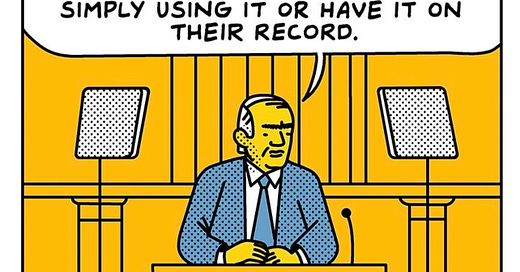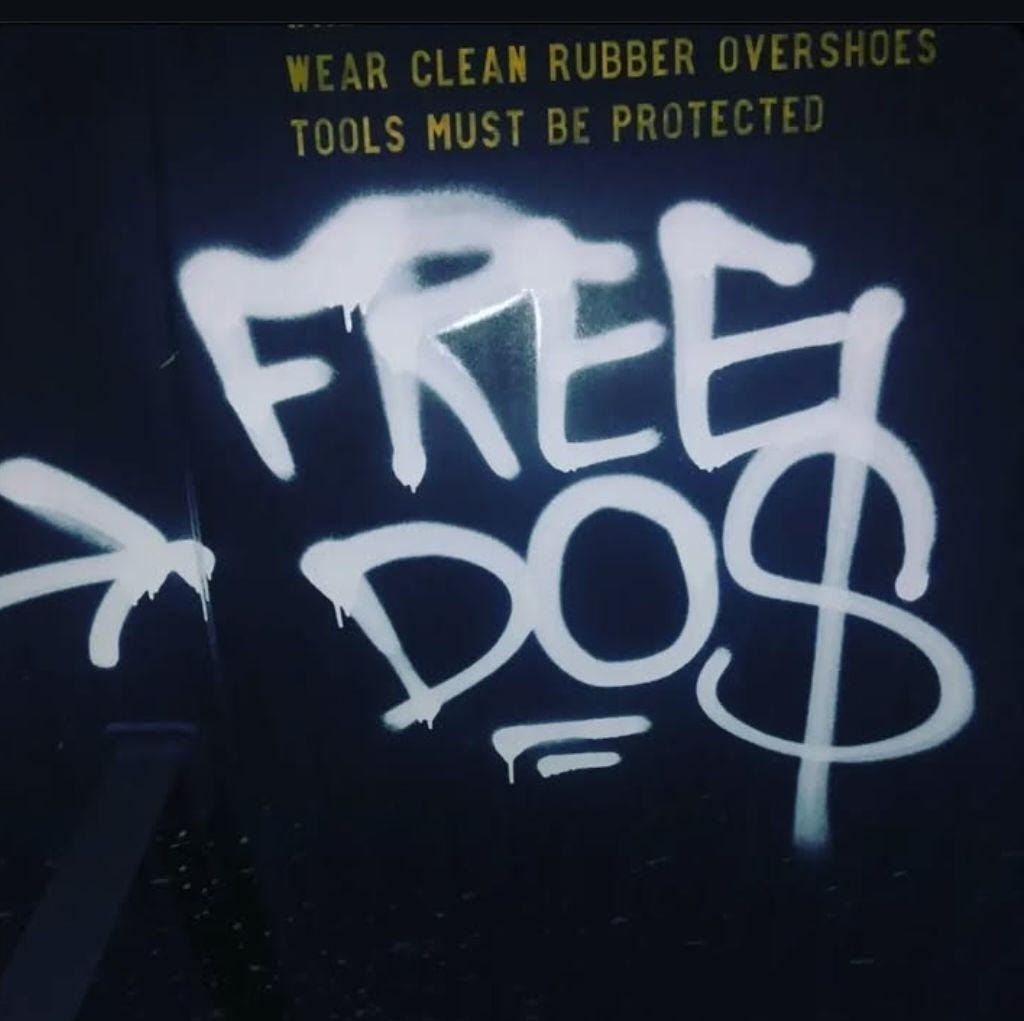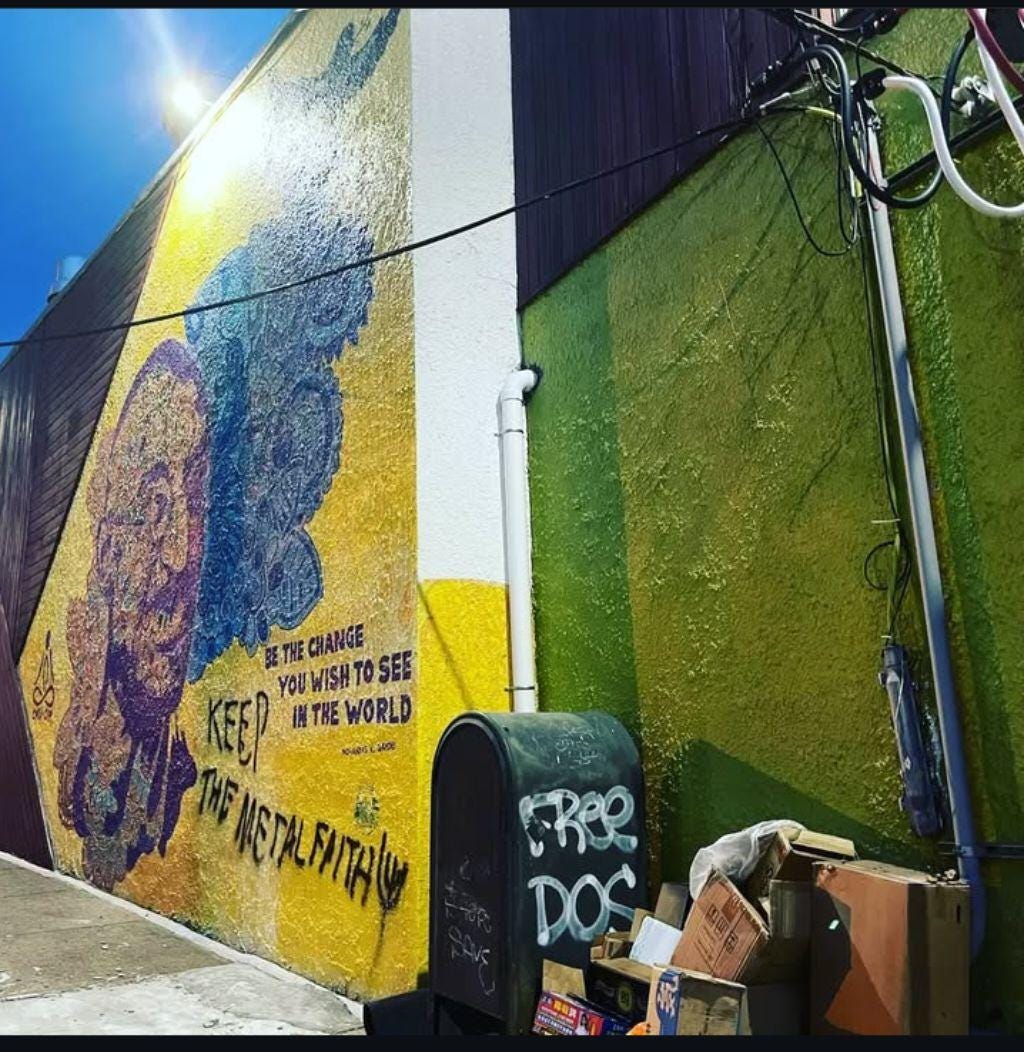On pardons, from a federal cannabis prisoner
One of the country's last federally imprisoned weed traffickers speaks about the federal clemency process
'Tis the season—the final days of an American presidency, when criminal justice advocates and opponents alike scramble after years of hurry-up-and-wait. It’s clemency season, but so far, neither Biden’s latest round of pardons nor his behavior has offered much relief for cannabis prisoners.
I have reported on the pardon process before, most notably during the final days of the last Trump presidency in 2021. Luke Scarmazzo, then imprisoned on a 22-year sentence for operating a state-legal medical dispensary in California, was notified he would be included in the batch of pardons to be granted on Trump’s way out. Scarmazzo, his family, lawyers and advocates, me, and many others sat glued to our phones for several days, waiting for the news to come down and for him to be released. Right before Biden was scheduled to be inaugurated–I’m talking mere hours before–we were all notified that Scarmazzo’s petition had been denied. I wrote about what happened–as much as we could figure out—and the article crested over a million clicks.
By reporting that piece and its surprising outcome, I got a deeper look into the clemency and pardon process than I ever expected. It’s opaque, fickle, and laden with special interests and handshakes. In addition, several long-time clemency activists have told me that the clock on each prisoner and their relationship or lack thereof with White House Counsel resets every new term or administration, according to whoever is in power and whatever other political factors dictate the day. Federal prisoners can only gain an early release through this process. The activists within the web work tirelessly, often for decades, in unclear, uphill, unfair, and sometimes unending battles. I’m comfortable saying it’s one of the most disheartening peeks into the machine I’ve gotten, but it’s an aspect of cannabis culture that we cannot look away from. (Scarmazzo was released in 2023 on compassionate grounds after serving 14 years. We “met” for the first time on camera for my old podcast, along with his advocate, Weldon Angelos, whose pardon I also covered).
Daniel Muessig, aka Dos-Noun, is nearing the end of his federal prison term and isn’t optimistic about the clemency process. He wanted to share about it and what comes next for Cannabitch’s readers. He is a celebrated freestyle rapper, criminal defense attorney, and former cannabis entrepreneur who ran what was widely considered Western Pennsylvania’s largest legacy cannabis business. For six years, his invite-only dispensary in Pittsburgh’s East End was a cornerstone of the local scene. Known for sharp branding and bold business tactics, he also built a wholesale distribution network. In 2019, an FBI raid ended his operations, and after refusing to cooperate with authorities, he received a five-year federal sentence.
Set for release later this year, Muessig doesn’t expect a pardon but is focused on life after prison. So often, the cannabis community focuses on getting out and less on what comes next. Here, Muessig shares his thoughts on the specter of pardons and lets us know how we can meaningfully help cannabis prisoners, especially once they are out: getting them gainfully employed in the industry in which they have expertise.
On Pardons
by
As Biden’s presidency winds down, America’s patchwork of ethnicities, constituencies, and interests waits for his final acts, bracing for that uniquely American cocktail of hope and resignation. Ukraine remains protected for now, electric vehicles are saved, trans children are left out in the legal cold, student loan debtors are screwed, Angelenos remain homeless, Greenland edges closer to apparent invasion if the news is to be believed, and the government shutdown has been averted—temporarily.
Meanwhile, an ever-shrinking group still dares to ask: Will Biden commute the sentences of federal cannabis prisoners? Not that promises mean much to a politician. He’s made these commitments repeatedly, particularly when courting cannabis consumer votes, spinning his way from center-right to center stage during the primaries. Promises like these fade fast when weighed against political convenience.
It also doesn’t matter that he’s pardoned his own son for firearms violations and financial missteps—American royalty operates by a different standard, a fact Biden has made abundantly clear. Nor does it matter that the vast majority of Americans, including those few who even realize people are still incarcerated for cannabis at the federal level, would support releasing those prisoners immediately. For decades, the federal government has been an unyielding, imperial entity at home and abroad, with its prosecutorial might immune to questions or critique. Biden, at his core, remains an octogenarian drug warrior, and any moments of apparent evolution on this issue have been little more than a calculated ploy.
To date, Biden has commuted the sentences of roughly ten federal cannabis prisoners—a drop in the ocean of over 1,700 still incarcerated. These rare commutations trickled out over the past four years and represent a negligible fraction of the overall drug-related incarcerations under his administration. In place of action, his administration has excelled at spreading disinformation to pacify voters.
Take the headlines trumpeting Biden’s change of heart about cannabis prisoners a few years back. Those headlines and the resulting reporting were largely wildly inaccurate. In truth, Biden only pardoned individuals with federal cannabis possession charges, primarily minor offenses from decades ago in Washington, D.C., where federal jurisdiction applies. None of these people served time. Dealers and growers—those who bore the brunt of prohibition—were left to rot in prison. Yet Biden claimed credit for wiping out the charges of a few smokers who got busted in national parks as a huge win for progress overall.
Or consider the recent claims that Biden "freed 1,500 federal prisoners." In reality, these prisoners had already been released years earlier under the CARES Act, living under strict conditions with ankle monitors. Biden’s contribution was confirming they wouldn’t be sent back to prison—a threat he had kept alive throughout his presidency. He merely snipped the strings he had held over them and called it mercy.
From the vantage point of someone living through this, I can attest that these narratives are just smoke and mirrors. I am one of the 1,700 federal prisoners still incarcerated for a first-time, non-violent, cannabis-only conspiracy. My crime is trafficking large amounts of cannabis. Despite my clean record and professional background—I was an attorney before this odyssey began—I still encounter disbelief when I explain my conviction. Even other prisoners struggle to believe anyone is still locked up for cannabis in 2025.
For those of us inside, the clemency process is a brutal, dehumanizing spectacle. We must act as our own press agents, crafting compelling narratives with photos and media assets to catch the attention of organizations and donors. Without a polished story to shop around, we are ignored and forgotten; our cases lost to obscurity. The system is designed to reduce us to contestants in a grotesque reality show where content determines our worthiness for freedom.
Freedom remains elusive even for those of us who manage to navigate this labyrinth. I recently learned that my clemency application was approved by the Office of the Pardon Attorney, a hurdle most never clear. Yet I remain in prison because the White House Counsel refuses to recommend the release of certain cannabis offenders without further elaborating. Biden has pardoned meth and heroin dealers, but cannabis? That’s a step too far. Protecting his legacy as a drug warrior takes precedence over delivering justice at the eleventh hour.
As I write this, I have no hope left. My life has been shattered, and I’ve spent years being taunted by the mirage of freedom. Even after I wrote my own clemency petition and saw it succeed, it has amounted to nothing. Last week, I turned 43, and I woke up in this violent, decaying hellhole, wishing I’d never been born.
Prison destroys more than just time. It leaves you unable to trust anyone and robs you of joy. The government that put me here created this nightmare, not the organizations trying to free me or the corporations profiting from legalization. But these groups, despite their good intentions, cannot overcome the systemic barriers that keep us locked away. Their efforts, though laudable, are hamstrung by a system designed to ensure we never go home and, if we do, that we will be back.
I don’t know what action to ask for. Letters, tweets, and petitions won’t change the fact that I’ll never hold my daughter on the day she was born or rebuild my life to where it was prior. All I can do is ask for a chance—once I am free this year—for a job that lets me support my family without returning to the world that brought me here.
Please contact me if you would like to be in touch with Daniel Muessig regarding work opportunities in and around the cannabis industry.
News from around the canna-sphere:
ICYMI: I published a list of resources relating to the LA fires
This ongoing news is getting uglier by the day: “DEA Judge Cancels Marijuana Rescheduling Hearings Amid Legal Challenges, Pushing Back Reform For At Least Three Months” and “Marijuana rescheduling judge blasts DEA for ‘unprecedented, astonishing’ behavior” and “Marijuana rescheduling process paused indefinitely after judge cancels hearing”
San Diego is getting its first cannabis café. Sessions by the Bay will open in February and will be a 12-room immersive art lounge-style space with full restaurant service and a consumption-free rooftop and bayfront seating area. We also had the co-owner and chef on the Happy Half Hour podcast, which I co-host. I also talked about it on the latest episode of Puff Puff Press and on air at CBS 8.
California’s Department of Cannabis Control has released a “Recall Portal.” As a vibey woman, I cannot resist any kind of portal, doubly as a reporting woman. “DCC is excited to announce the launch of the new Cannabis Recall Portal, offering an improved user interface, enhanced search functionality, and a more visual experience to help you quickly access recall information. Consumers can easily track recalled products and stay informed.”
“Customer Data of Cannabis Brand Stiiizy Exposed in Data Breach.” Sigh.
“Cannabis debt crisis looms as billions of loans come due in 2026.” This is something I have been salivating over reading about as a former credit analyst, and I was pleased to see this report by Chris Roberts at MJBizDaily, who, as always, does a bang-up job breaking it down. Basically, $3 billion in debt is set to mature by the end of 2026, and the impending wave of maturities could lead to substantial restructuring within the regulated market. Some analysts think companies have time to strategize favorable refinancing options. However, external factors, like looming federal or state reforms that could open new markets or streamline operations, will play a crucial role in how this plays out. In an industry with limited access to traditional capital funding and a heavy reliance on debt financing, it’s tough news on top of all the rest.
“THC overdose” lands dispensary in legal trouble.” A Portland man took "start low, go slow" as a challenge, downing a capful of THC syrup and landing in the ER. Now, he's suing the dispensary for $10,000, proving sometimes the real trip is the legal process. Reddit went nuts on the guy.
Also interesting from the team at GreenState: a look at Cannabis Induced Psychosis and who is at risk, as well as a review of Señorita agave-sweetened, THC-infused margaritas.
Nebraska’s medical cannabis saga just got juicier: opponents of the voter-approved initiative are suing the Nebraska Medical Cannabis Board and multiple state agencies. They’re pushing to overturn the law that created the state’s medical cannabis industry, claiming its existence violates state and federal rules.
Bloomberg investigates so-called “cannabis cocktails” with an eye toward the product segment’s headwinds. Those include inconsistent regulations across states, restrictions on interstate commerce, and advertising limitations. Producers must navigate a patchwork of compliance rules. At the same time, federal prohibition adds uncertainty to market expansion and competition with traditional alcohol brands, and the need for consumer education about dosing and its effects presents further hurdles. You know, I don’t even prefer drinks in my cannabis routine, but this conversation is becoming intellectually grating, however fascinating it is from a nerdy policy perspective. I want drinks to succeed on principle and triumph over this bullshit red tape.
This headline at NPR cracks me up. “Despite strict laws, Texas is awash in intoxicating cannabis.” DESPITE. From the piece: “Today, Texas has more than 7,000 cannabis dispensaries, almost twice as many as California. Add to that: 24-hour cannabis delivery, mobile pot trucks, cannabis vending machines, and mail-order cannabis.” Lol. Sounds amazing. Of course, they are talking about “intoxicating hemp.” Everyone knows that making things illegal makes them go away entirely and totally, once and for all, so I am not sure why anyone is surprised ;)
And here’s some industry gossip to send you away with: a tipster messaged me last night, saying they spotted beleaguered former Florida Congressman and cannabis industry activist and businessman Matt Gaetz at a local San Diego dispensary. Word on the street is he’s here working on his new show at One America News, the right-wing news channel based in town. I can confirm the news, though I can’t say how, as it would reveal my source. Lol.











I think work like this will be an important time piece for what was happening at the time. Nice read thanks for putting time in.